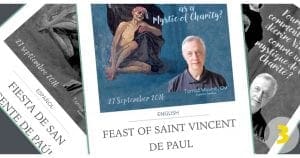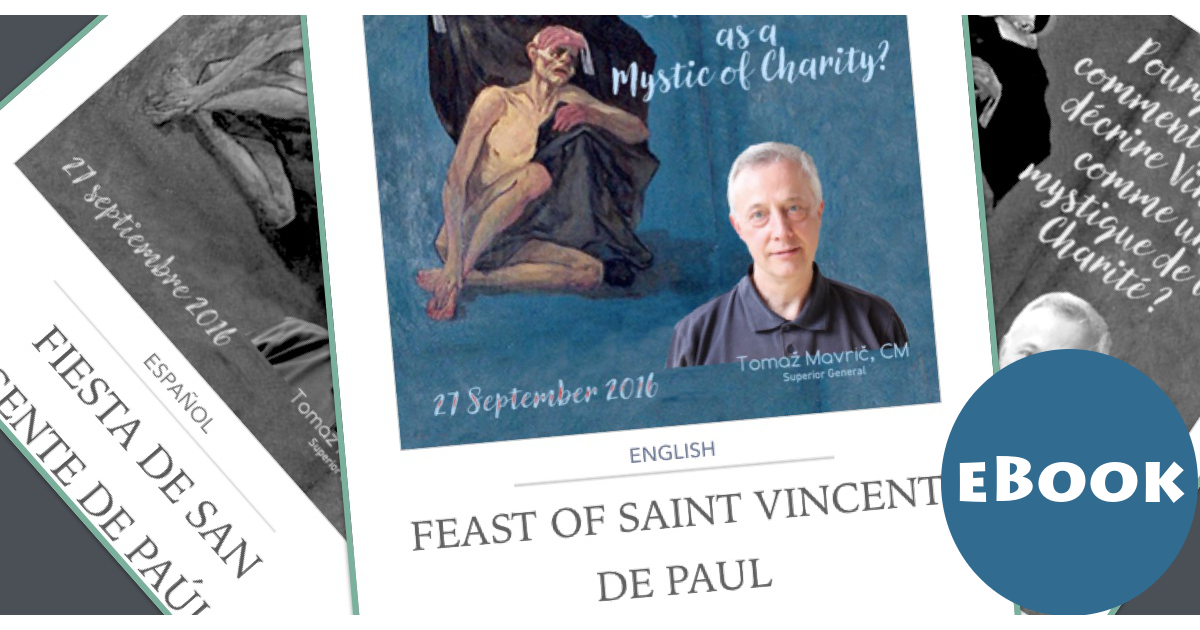Yesterday we examined the first of “three takes” on the idea of Vincent as a “mystic of charity.” Today we’ll look at the second. Don’t have the letter at hand? Click here for lots of versions, or click the image that follows for the recently published multi-language eBook. Got it? Okay, Take two, by Father Robert Maloney, C.M.
Maloney says:
When we speak of mystics, we usually think of people who have extraordinary religious experiences. Their quest for God moves from active search to passive presence. They pray, as Saint Paul says to the church in Rome (8:26), “with sighs and groans too deep for human words.” Mystics have ecstatic moments when they are completely lost in God, “whether in the body or out of the body, I do not know,” as Saint Paul recounts his experience in 2 Corinthians 12:3. At times, they have visions and receive private revelations. They attempt, with difficulty, to describe for others their moments of intense light and painful darkness. Saint Vincent knew the writings of mystics like Teresa of Avila and John of the Cross. Though generally cautious about unusual spiritual phenomena, he admired Madame Acarie, one of the renowned mystics of his day, who lived in Paris during his early years there.
Vincent’s brand of mysticism was strikingly different. He found God in the people and events around him. His “visions” were deeply Christological. He saw Christ in the face of the poor. To use a phrase from the Jesuit tradition that has become popular in Vincentian documents, he was a “contemplative in action.” Christ led him to the poor and the poor led him to Christ. When he spoke of the poor and when he spoke of Christ, his words were often ecstatic. He told his priests and brothers: “If we ask Our Lord, ‘What did you come to do on earth?’ he answers, ‘To assist the poor.’ ‘Anything else?’ ‘To assist the poor.’ So, are we not very fortunate to belong to the Mission for the same purpose that caused God to become man? And if someone were to question a Missioner, wouldn’t it be a great honor for him to be able to say with Our Lord, ‘He sent me to preach the good news to the poor’” (CCD:XI:98). When he spoke about Christ, he could be rapturous. In 1655, he cried out, “Let us ask God to give the Company this spirit, this heart, this heart that causes us to go everywhere, this heart of the Son of God, the heart of Our Lord, the heart of Our Lord, the heart of Our Lord, that disposes us to go as He went … He sends us, like the apostles, to bring fire everywhere, to bring this divine fire, this fire of love …” (CCD:XI:264).
For Vincent, the horizontal and the vertical dimensions of spirituality were both indispensable. He saw love of Christ and love of the poor as inseparable. Again and again, he urged his followers not just to act but also to pray, and not just to pray but also to act. He heard an objection from his followers: “But there are so many things to do, so many house duties, so many ministries in town and country; there’s work everywhere; must we, then, leave all that to think only of God?” And he responded forcefully: “No, but we have to sanctify those activities by seeking God in them, and do them in order to find Him in them rather than to see that they get done. Our Lord wills that we seek above all His glory, His kingdom, and His justice, and, to do this, we make our primary concern the interior life, faith, trust, love, our spiritual exercises, meditation, shame, humiliations, our work and troubles, in the sight of God our Sovereign Lord. Once we’re grounded in seeking God’s glory in this way, we can be assured that the rest will follow” (CCD:XII:111).
In a ground-breaking 11-volume work written almost a century ago, Henri Brémond described Saint Vincent’s era as the time of “The Mystical Conquest.” At the conclusion of an eloquent chapter about Vincent, he stated: “It was mysticism that gave us the greatest of our men of works” (Histoire littéraire du sentiment religieux en France, III « La Conquête Mystique » (Paris, 1921), p. 257).
Reflection and challenge:
You can reflect on these questions to explore this second of three takes on our mystic of charity:
1. Do you find God “in the people and events around” you? 2. Do you act and pray, and pray and act? 3. Do you allow time for reflection before, during and after projects to look for God in “order to find Him in them rather than to see that they get done”?
 Pray and reflect. Tomorrow, we’ll look at the third and final contribution to this special emphasis of Fr. Tomaž Mavrič.
Pray and reflect. Tomorrow, we’ll look at the third and final contribution to this special emphasis of Fr. Tomaž Mavrič.








0 Comments